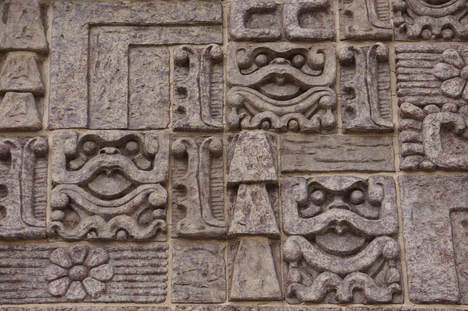Linguistic Anthropology
Linguistic anthropology is the study of language. What makes it different from the field of linguistics is that a linguistic anthropologist studies how language effects culture and cultural exchange through language use. This can include non-verbal communication like gestures and body language.
Further Information
 Mayan heiroglyphics. Taken by flickr user EarlRShumaker.
Mayan heiroglyphics. Taken by flickr user EarlRShumaker.
Below is a short lesson on the history of language.
Focus:
Learning Objectives
Focus:
- How did language start? What are early forms of language? How do we study cultures that don’t have a written representation of their language?
Learning Objectives
- Students will learn about when language began
- Most scientists agree that we don’t know much about the origin of how language began.
- We usually trace language through written records.
- Prehistory: history before written languages began
- History: time after written records were established.
- Students will learn about early languages.
- Lots of written records started from pictures that over time turned into more abstract characters
- Cuneiform (4000 bc-75 AD): cuneiform was used by the Sumerians in Mesopotamia
- It is one of the earliest writing styles in the world.
- Chinese (1500 BC-present) Chinese characters started as pictures which eventually through thousands of years has become what we see as modern Chinese
- Cuneiform (4000 bc-75 AD): cuneiform was used by the Sumerians in Mesopotamia
- Some writing systems just used pictures, and are known as hieroglyphics
- The Egyptians, Aztecs, and Mayans all used this system.
- Lots of written records started from pictures that over time turned into more abstract characters
 An example of an Inca quipu. Taken by flickr user, bobistraveling
An example of an Inca quipu. Taken by flickr user, bobistraveling
- Students will learn about people that do not have written languages
- The Inca
- The Inca people in Andes mountains had a special kind of communication.
- They used knotted ropes of various colors to send messages.
- This is called “Quipu.”
- Modern Andean people still use quipu to keep track of their livestock numbers.
- Native American tribes
- Native American tribes did not have written language until after European contact.
- Linguistic anthropologists and tribe members have worked to make a writing system for some of these cultures so they can keep a written record of all their traditions for future generations.
- African Kingdoms
- There were several kingdoms in Africa that achieved complex societies without the use of a written language.
- In many cases, these people passed down their history through oral traditions, like songs or stories.
- The Hindu religion has an oral tradition that goes with their written religion.
- These songs are passed down from generation to generation.
- In native American tribes, these tales still survive today in some cases.
- Anthropologists study these songs and stories to help learn about the cultures they come from.
- The Inca
Kelly Likos talking about linguistic anthropology
Lesson Plans
Common Core
Linguistic anthropology could be a tool you employ when teaching students about Language according to the Standards for English Language Arts & Literacy
An example: Common Core curricula states that at 3rd grade, students should "use knowledge of language and its conventions when writing, speaking, reading, or listening." They also must "recognize and observe differences between the conventions of spoken and written standard English." One of the things we talk about in our listen is how cultural differences between how we show respect to a teacher and how we show respect to a friend affect what language we employ.
Click here to learn more about Common Core.
An example: Common Core curricula states that at 3rd grade, students should "use knowledge of language and its conventions when writing, speaking, reading, or listening." They also must "recognize and observe differences between the conventions of spoken and written standard English." One of the things we talk about in our listen is how cultural differences between how we show respect to a teacher and how we show respect to a friend affect what language we employ.
Click here to learn more about Common Core.
